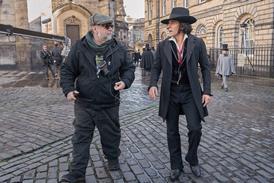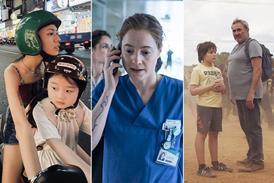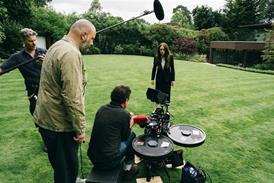Rain could be an Antipodean companion piece to The Ice Storm, for the two films share quite a few things in common: an early 1970s setting, a literary source, an unsettled family, the confusing effects of the sexual revolution, particularly for women, a devastating death and - as the titles of both movies suggest - the malignant presence of the elements. Jeffe's debut feature (her short, Stroke, played in competition in Cannes in 1994) remains an extremely minor piece, since it also lacks the directorial poise and complexity of Ang Lee's movie as well as high-profile cast names, the boost of a cult novel and Ice Storm's rich socio-political background. However it marks Jeffs out as a promising director and while its theatrical profile is likely to be modest, the movie should expect some mileage from festival and limited arthouse exposure.
The action unfolds in an isolated, rather ugly house by the sea where 13-year-old Janey and her family spend their annual summer vacation. 1972 is a turbulent year for the women: Janey is awash with hormones while her mother, Kate, is chafing at the bit in her marriage and spends most of the time chain-smoking and drinking heavily, pleasures strictly forbidden to her resentful daughter. Drifting on the margins are the males: Janey's father, Ed, who's preoccupied with improving what he still likes to think of as his little patch of paradise and her small brother, Jim, a carefree, cheeky redhead who steals all his scenes.
As the parents throw an unending series of boozy beach parties, it quickly becomes obvious to Janey that her mother is flirting openly with Cady, an itinerant photographer who lives on a nearby boat and instantly becomes a source of intense fascination. Charged with looking after the much younger Jim, whom she's also teaching to swim, Janey has a ball with her feisty brother, but at the same time detests being lumped together with him as a child and yearns to enter the adult world.
After Kate visits Cady for a tryst on his boat, her marriage begins to crumble, while Janey in her turn, in a mix of jealousy and curiosity, sets her cap at the photographer. At their meeting in the woods, ostensibly in order for him to shoot her, she appropriates his camera in a bid to assert control before launching into her own sexual initiation.
The performances are all solid though without distinction, with the exception of little Aaron Murphy, who plays Jim and is a natural screen presence. The Cady character, however, remains dull and curiously passive, though perhaps that's the point of a film that's primarily focussed on women of different generations trying to carve out an independent place in the world. Technical credits are OK, but without the skewed vision that, say, Jane Campion, might have brought to this material. Clayton's production design exploits to advantage the warm autumnal browns and oranges of the period.
Prod cos Rose Road, Communicado.
Int'l sales New Zealand Film Commission.
Prod Philippa Campbell.
Scr Jeffs, based on the novel by Kirsty Gunn.
Cinematography John Toon.
Prod des Kirsty Clayton.
Ed Paul Maxwell.
Music.Neil Finn.
Main cast. Alicia Fulford-Wierzbicki, Sarah Peirse, Marton Csokas, Alistair Browning, Aaron Murphy.

















No comments yet